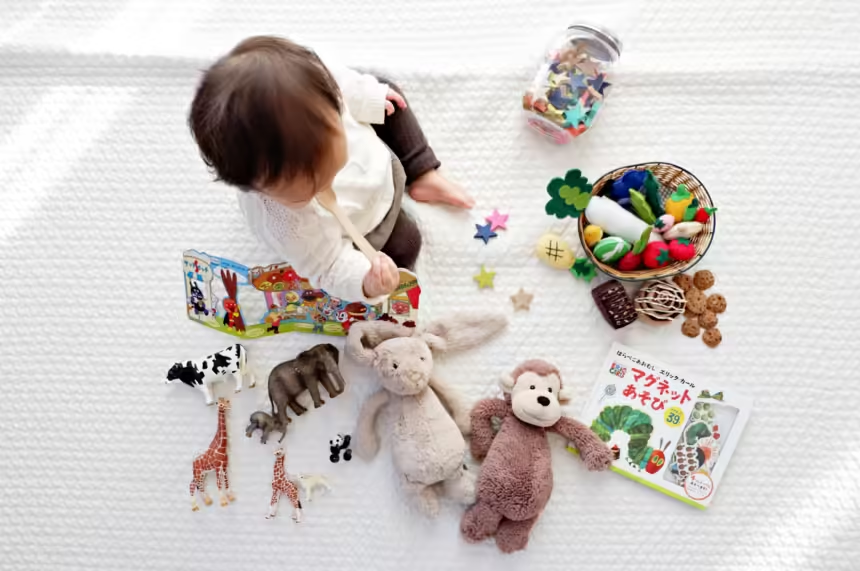As a parent, ensuring the safety of your baby is important, especially when it comes to the products they come into contact with daily. From clothing to toys and feeding supplies, contaminants can potentially harm your little one’s delicate health.
With increasing concerns about toxins and impurities, it’s crucial to be informed about the potential risks associated with baby products. In this guide, we aim to provide essential tips for selecting safe and contaminant-free items for your baby.
Choosing Safe Baby Toys and Products
When choosing toys for your infant, prioritize those made of non-toxic materials and free of tiny components that might cause choking risks. Look for toys that are labeled BPA-free and phthalate-free, as these chemicals can be harmful to your baby’s health. To keep toys safe and free of harmful pollutants, clean and check them regularly.
Seattle Children’s Hospital notes that plastics can be dangerous for children up to 3 years old as they often put things in their mouths. The plasticizers in these materials have the potential to release substances that interfere with testosterone and estrogen levels. In young children, such hormonal disruption can influence proper brain development and growth.
How can eco-friendly products improve baby safety?
Consider eco-friendly options that use natural materials and sustainable practices. With careful product selection, you can contribute to making your baby’s surroundings safer. To guarantee continued protection, always keep up with the most recent safety regulations and product recalls.
Evaluating Baby Formula for Safety
Baby formula is a critical component of infant nutrition, and ensuring its safety is crucial. Look for solutions that meet stringent safety guidelines and contain no dangerous ingredients or pollutants. Look for brands that are open about their source of ingredients and production procedures.
How can I verify baby formula safety and quality?
Check for certifications like organic or non-GMO to ensure the formula is made from high-quality, safe ingredients. Be cautious of any formula that has been recalled or reported for contamination issues. Properly store formula according to the manufacturer’s guidelines to avoid contamination and spoilage.
Legal Action Against Baby Formula
Lawsuits are on the rise against major baby formula producers, claiming that their formulas have led to necrotizing enterocolitis (NEC) in premature babies. As per TorHoerman Law, the lawsuits allege that certain components in cow’s milk-based formulas increase the likelihood of developing this serious intestinal condition. These cases underscore the importance of carefully evaluating formula ingredients to ensure the safety of infants.
Reuters reported in March 2024 that an Illinois jury awarded $60 million to a mother after her premature baby died from Enfamil-linked NEC. The jury determined that Mead Johnson was negligent for not warning about the NEC risk. The Enfamil lawsuit underscores the legal risks for formula companies that do not disclose potential health hazards.
Contaminants in Baby Personal Care Products
Baby personal care products, such as lotions, shampoos, and diapers, can be a source of contaminants if not carefully chosen. Select items that are hypoallergenic and devoid of artificial coloring, scents, and parabens, since these ingredients may aggravate delicate skin. Look for certifications from pediatric or dermatological associations that attest to the items’ effectiveness and safety.
To reduce the chance of being exposed to dangerous chemicals, use products made with either organic or natural components. Keep an eye on the ingredient lists and steer clear of items that include strange or questionable ingredients. Choosing harmless personal care products will improve your baby’s general health.
As highlighted by the NIH, the food industry has authorized over 10,000 additives, including sweeteners, colors, preservatives, and taste enhancers. According to studies, these additives have the potential to negatively impact children’s health. This emphasizes the significance of thoroughly inspecting every ingredient in foods meant for children.
Why is it important to avoid synthetic fragrances in baby products?
Synthetic fragrances can irritate sensitive skin and cause allergic reactions in babies. Opting for fragrance-free or naturally scented products helps minimize these risks. Choosing hypoallergenic products further reduces the chance of skin irritation and ensures a safer experience for your baby.
Safeguarding your baby from harmful contaminants necessitates a proactive approach to product selection. Parents can create a healthier environment for their infants by prioritizing natural materials, avoiding synthetic additives, and staying informed about safety standards and recalls.
The growing body of research and legal actions highlights the critical importance of examining product ingredients and holding manufacturers accountable. Ultimately, informed and vigilant parents play a pivotal role in protecting their baby’s well-being.





